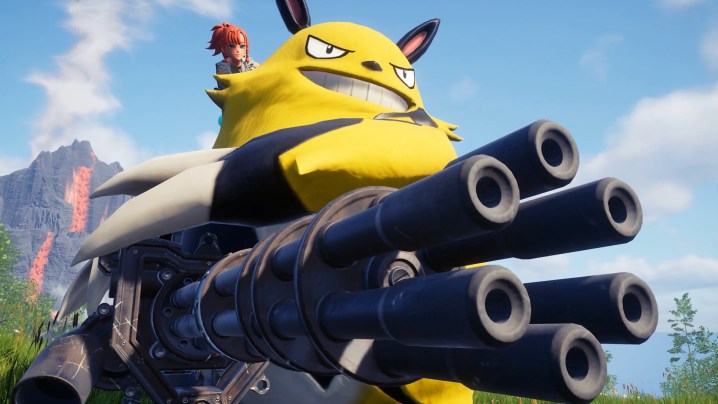
We have our first hit video game of 2024, and it’s a shocker. The eccentric Palworld, an early access game available now on PC and Xbox Game Pass, is smashing Steam records as developer Pocketpair sells millions of copies. That’s thanks in large part thanks to its bizarre elevator pitch, which is succinctly described as “Pokémon with guns.”
That success has come with some heated debates. Palworld earned a lot of criticism in its inaugural weekend as players discovered monster designs that looked nearly identical to some of those in Pokémon. Accusations of plagiarism ballooned into suspicions over AI usage that have yet to be proven. An army of already dedicated fans have rushed to its defense with their own over-the-top claims. That army includes disgruntled Pokémon fans who see the new game as an antidote to buggy titles like Pokémon Scarlet and Violet. Palworld defenders have already labeled it a “Pokémon killer” and hope that Game Freak learns from its success.
Whether you love it or hate it, that last notion is an absurd one. Palworld can’t be a Pokémon killer because it’s nothing like Pokémon.
Surviving the discourse
Arguments about Palworld and the threat it poses to Pokémon can be shut down minutes into booting up the game. Pokémon is a narrative-focused RPG with an emphasis on careful team-building and strategy. Palworld is a survival crafting game that mostly has players building bases. It has more in common with Fortnite than it does Pokémon. I have to imagine that any claims that Palworld could defeat Pokémon is coming from people who have yet to play it.
The entire line of thinking falls apart there, but it further erodes when considering the audience for each game. Palworld seems clearly aimed at slightly older audiences, courting teens with its edgy humor. Players can eventually create sweatshops where they can force their creatures to mass-produce realistic rifles. It’s a funny gag, but it makes it crystal clear that Palworld isn’t after Nintendo’s audience.

The entire appeal of Pokémon is that it’s friendly for kids and families. Its RPG combat is easy enough to understand, and young kids who can’t quite get it can still have fun simply collecting cute critters. That’s always been a winning formula for The Pokémon Company, even in the series’ lowest moments. Both Sword/Shield and Scarlet/Violet have sold more than 20 million units on Nintendo Switch despite buggy, graphically poor releases. Palworld could hit those numbers, considering it’ll have a long lifespan, but its audience isn’t exactly the same.
While the notion of Palworld “killing” one of gaming’s most profitable series is absurd, other fans have a more down-to-earth take here. So far, a common refrain among fans is that they hope Palworld‘s success will force the developers at Game Freak to take notes on what players want. That’s a more realistic outcome. While Palworld in no way resembles the mainline Pokémon series, it does share some very loose similarities to Pokémon Legends: Arceus. There are some ideas here that could inspire Game Freak for its eventual follow-up.
Even then, I still struggle to see what cues the studio would take here. Palworld features a loose combat system at present that takes the basic ideas of Pokémon but splays them out into a much thinner, passive system. It’s hard to see Game Freak taking a deconstructed version of its own tight battle system and rebuilding a less involved version of it. You’re more likely to see the studio learn from combat-heavy titles like Cassette Beasts.
Palworld is a bit of a one-way street creatively, borrowing ideas that aren’t transferable in the other direction. Its monster designs, for instance, largely just ape preexisting monsters in Pokémon. That’s not a problem; Palworld‘s appeal is that it’s an edgy satire of Pokémon. It takes the ethical questions of monster collecting that fans have entertained for decades and takes it to a logical conclusion. You’re literally enslaving these creatures. That doesn’t leave Game Freak a lot to draw from, though. Pokémon taking inspiration from Palworld would be like Marvel taking ideas from The Boys.

However, it’s a different line of thinking that puzzled me most over the weekend. Some kneejerk reactions have posited that Palworld could force Game Freak to up its quality control following the disastrous launch of Pokémon Scarlet and Violet. That would be a fine argument if Palworld itself were in tip-top shape right now, but that’s not the case. it’s currently available in early access with a big emphasis on early. Its UI is a cluttered mess of tiny text and menus haphazardly copied from other games. My short time checking it out was filled with bugs and janky gameplay — understandable for an early-access game. There’s hardly a story or any hint of worldbuilding. A lot of effort has gone into replicating and refining the basics of the crafting genre, but it’s not a polished game by any metric.
The current conversations around Palworld are overeager for a game in such an early state. It feels like fans are dying to use it as a “gotcha!” so they can stick it to a Pokémon Company that’s struggled to please older players in the Switch era. I empathize with the instinct, but Palworld isn’t much of a bargaining chip. It’s an entirely different beast, even if it looks suspiciously similar on its surface.
Palworld is available in early access on PC and Xbox Game Pass.



